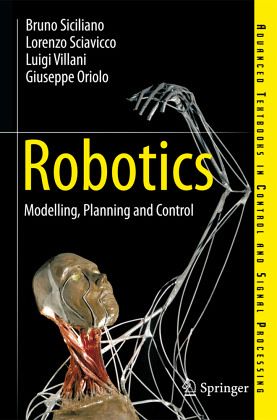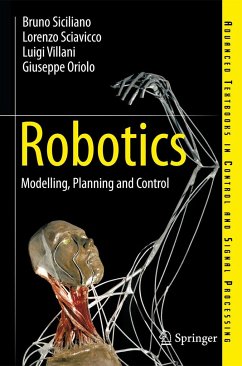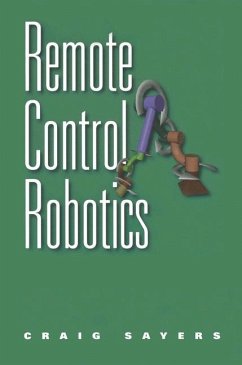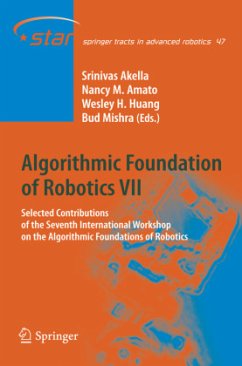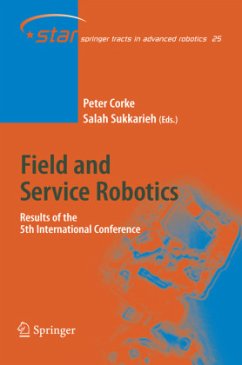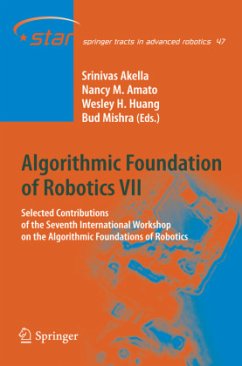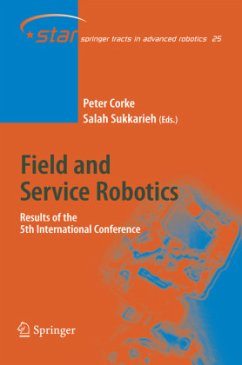Robotics
Modelling, Planning and Control
Versandkostenfrei!
Versandfertig in 1-2 Wochen
Weitere Ausgaben:

PAYBACK Punkte
30 °P sammeln!





The classic text on robot manipulators now covers visual control, motion planning and mobile robots too!Based on the successful Modelling and Control of Robot Manipulators by Sciavicco and Siciliano (Springer, 2000), Robotics provides the basic know-how on the foundations of robotics: modelling, planning and control. It has been expanded to include coverage of mobile robots, visual control and motion planning. A variety of problems is raised throughout, and the proper tools to find engineering-oriented solutions are introduced and explained.The text includes coverage of fundamental topics like...
The classic text on robot manipulators now covers visual control, motion planning and mobile robots too!
Based on the successful Modelling and Control of Robot Manipulators by Sciavicco and Siciliano (Springer, 2000), Robotics provides the basic know-how on the foundations of robotics: modelling, planning and control. It has been expanded to include coverage of mobile robots, visual control and motion planning. A variety of problems is raised throughout, and the proper tools to find engineering-oriented solutions are introduced and explained.
The text includes coverage of fundamental topics like kinematics, and trajectory planning and related technological aspects including actuators and sensors.
To impart practical skill, examples and case studies are carefully worked out and interwoven through the text, with frequent resort to simulation. In addition, end-of-chapter exercises are proposed, and the book is accompanied by an electronic solutions manual containing the MATLAB® code for computer problems; this is available free of charge to those adopting this volume as a textbook for courses.
Based on the successful Modelling and Control of Robot Manipulators by Sciavicco and Siciliano (Springer, 2000), Robotics provides the basic know-how on the foundations of robotics: modelling, planning and control. It has been expanded to include coverage of mobile robots, visual control and motion planning. A variety of problems is raised throughout, and the proper tools to find engineering-oriented solutions are introduced and explained.
The text includes coverage of fundamental topics like kinematics, and trajectory planning and related technological aspects including actuators and sensors.
To impart practical skill, examples and case studies are carefully worked out and interwoven through the text, with frequent resort to simulation. In addition, end-of-chapter exercises are proposed, and the book is accompanied by an electronic solutions manual containing the MATLAB® code for computer problems; this is available free of charge to those adopting this volume as a textbook for courses.
Bruno Siciliano is Professor of Control and Robotics at the University of Naples Federico II in Italy, President of the IEEE Robotics and Automation Society, and a Fellow of both IEEE and ASME. He is Co-Editor of the Springer Tracts in Advanced Robotics series, and the Springer Handbook of Robotics. His research interests include identification and adaptive control, impedance and force control, visual tracking and servoing, redundant and cooperative manipulators, lightweight flexible arms, space robots, human-centered and service robotics. He has co-authored 6 books, 6 edited volumes, and over 240 technical papers. Lorenzo Sciavicco is Professor of Control and Robotics at the Third University of Rome in Italy. He has been one of the pioneers of robot control research. His research interests include automatic control theory and applications, manipulator inverse kinematics techniques, redundant manipulator control, force/motion control of manipulators, and cooperative robot manipulation. He has co-authored 3 books, 1 edited volume, and over 100 technical papers. Luigi Villani is Associate Professor of Control and Robotics at the University of Naples Federico II in Italy. His research interests include identification and adaptive control, impedance and force control, visual tracking and servoing, redundant and cooperative manipulators,and service robotics. He has co-authored 2 books, 1 edited volume, and over 120 technical papers. Giuseppe Oriolo is Associate Professor of Control and Robotics at the University of Rome "La Sapienza" in Italy. He is an Editor of the IEEE Transactions on Robotics. His research interests include nonlinear control and robotics, visual servoing, redundant manipulators, mobile and nonholonomic robots, motion planning, sensor-based navigation and exploration, and service robotics. He has co-authored 2 books and over 120 technical papers.
Produktdetails
- Advanced Textbooks in Control and Signal Processing
- Verlag: Springer / Springer London / Springer, Berlin
- Artikelnr. des Verlages: 978-1-84996-634-4
- Softcover reprint of hardcover 1st edition 2009
- Seitenzahl: 656
- Erscheinungstermin: 21. Oktober 2010
- Englisch
- Abmessung: 235mm x 155mm x 36mm
- Gewicht: 974g
- ISBN-13: 9781849966344
- ISBN-10: 1849966346
- Artikelnr.: 32759719
Herstellerkennzeichnung
Springer-Verlag GmbH
Tiergartenstr. 17
69121 Heidelberg
ProductSafety@springernature.com
Robotics: Modelling, Planning and Control is a book that comprehensively covers all aspects of robotic fundamentals. It is particularly an excellent text for graduate educators, as it covers the fundamentals of the field with a rigorous formalism that is well blended with the technological aspects of robotics. The text covers in detail the theory of manipulators and wheeled robots starting with kinematics, dynamics and motion control, as well interaction with the environment through perception - force and vision sensors. The book is written by technical authorities in the field, and will be in invaluable addition to graduate education as well as a useful guide for industrial practitioners. Alexander Zelinsky, CSIRO, Australia Robotics is a
Mehr anzeigen
diverse field bringing together disparate areas from computer science, electrical engineering and mechanical engineering. This book is an integrative but rigorous treatment of all the relevant concepts, with an eye toward modern, practical applications making it an excellent choice for a first year graduate course in robotics. Vijay Kumar, University of Pennsylvania This book provides rock-solid foundations for the study of classical mechanics and control of robots, with the authoritative character of a reference where you can surely find the correct expression and the rigorous derivation of the results you need. On top of this, new chapters on motion planning, visual servoing, and mobile robot control provide support to teaching wider and more interdisciplinary aspects of robotics, and open up vistas that will certainly inspire a new generation of scholars to embrace this incredibly rich and fertile research field. Antonio Bicchi, University of Pisa, Italy This book offers a well-balanced and intellectually satisfying treatment of robot mechanics, planning, and control - from the choice and sequence of topics, to the level of detail in the analysis, and the clear connections made between the latest technologies and the theoretical foundations of robotics, this book is an essential element in the library of every aspiring young robotics researcher. Frank Chongwoo Park, Seoul National University Robotics: Modeling, Planning and Control is a historiography from the materialistic view of robotics. Authors clearly explain physical and mathematical foundation to understand the most up-to-date robotics, so faithfully to bibliography and terminology in robotics. Unquestionably, the best textbook for senior students and graduate students and the closest reference book for engineers and scientists! Yoshihiko Nakamura, University of Tokyo Exceptional! A text with such a span of robotics fundamentals and advanced research in both manipulation and mobility, and a treatment that creatively balances mathematical depth and physical intuition - a fresh and certainly unique reference for researchers and engineers in the field of robotics. Oussama Khatib, Stanford University Certainly because of its youth, robotics is not always considered as a discipline as such. It is often introduced as a technological "area" integrating various aspects of mechanics, automatic control and computer science. Such a dispersed view is prejudicial for students. The book by Siciliano et al. achieves the introduction of the basic concepts in a coherent, self-contained and didactic way. In that sense, when reading Robotics: Modelling, Planning and Control the reader - from the undergraduate student to the researcher - understands that a new discipline is born, with its own foundations. Jean-Paul Laumond, LAAS-CNRS
Schließen
Robotics: Modelling, Planning and Control is a book that comprehensively covers all aspects of robotic fundamentals. It is particularly an excellent text for graduate educators, as it covers the fundamentals of the field with a rigorous formalism that is well blended with the technological aspects of robotics. The text covers in detail the theory of manipulators and wheeled robots starting with kinematics, dynamics and motion control, as well interaction with the environment through perception - force and vision sensors. The book is written by technical authorities in the field, and will be in invaluable addition to graduate education as well as a useful guide for industrial practitioners.
Alexander Zelinsky, CSIRO,
Alexander Zelinsky, CSIRO,
Mehr anzeigen
Australia
Robotics is a diverse field bringing together disparate areas from computer science, electrical engineering and mechanical engineering. This book is an integrative but rigorous treatment of all the relevant concepts, with aneye toward modern, practical applications making it an excellent choice for a first year graduate course in robotics.
Vijay Kumar, University of Pennsylvania
This book provides rock-solid foundations for the study of classical mechanics and control of robots, with the authoritative character of a reference where you can surely find the correct expression and the rigorous derivation of the results you need. On top of this, new chapters on motion planning, visual servoing, and mobile robot control provide support to teaching wider and more interdisciplinary aspects of robotics, and open up vistas that will certainly inspire a new generation of scholars to embrace this incredibly rich and fertile research field.
Antonio Bicchi, University of Pisa, Italy
This book offers a well-balanced and intellectually satisfying treatment of robot mechanics, planning, and control - from the choice and sequence of topics, to the level of detail inthe analysis, and the clear connections made between the latest technologies and the theoretical foundations of robotics, this book is an essential element in the library of every aspiring young robotics researcher.
Frank Chongwoo Park, Seoul National University
Robotics: Modeling, Planning and Control is a historiography from the materialistic view of robotics. Authors clearly explain physical and mathematical foundation to understand the most up-to-date robotics, so faithfully to bibliography and terminology in robotics. Unquestionably, the best textbook for senior students and graduate students and the closest reference book for engineers and scientists!
Yoshihiko Nakamura, University of Tokyo
Exceptional! A text with such a span of robotics fundamentals and advanced research in both manipulation and mobility, and a treatment that creatively balances mathematical depth and physical intuition - a fresh and certainly unique reference for researchers and engineers in the field of robotics.
Oussama Khatib, Stanford University
Certainly because of its youth, robotics is not always considered as a discipline as such. It is often introduced as a technological "area" integrating various aspects of mechanics, automatic control and computer science. Such a dispersed view is prejudicial for students. The book by Siciliano et al. achieves the introduction of the basic concepts in a coherent, self-contained and didactic way. In that sense, when reading Robotics: Modelling, Planning and Control the reader - from the undergraduate student to the researcher - understands that a new discipline is born, with its own foundations.
Jean-Paul Laumond, LAAS-CNRS
Robotics is a diverse field bringing together disparate areas from computer science, electrical engineering and mechanical engineering. This book is an integrative but rigorous treatment of all the relevant concepts, with aneye toward modern, practical applications making it an excellent choice for a first year graduate course in robotics.
Vijay Kumar, University of Pennsylvania
This book provides rock-solid foundations for the study of classical mechanics and control of robots, with the authoritative character of a reference where you can surely find the correct expression and the rigorous derivation of the results you need. On top of this, new chapters on motion planning, visual servoing, and mobile robot control provide support to teaching wider and more interdisciplinary aspects of robotics, and open up vistas that will certainly inspire a new generation of scholars to embrace this incredibly rich and fertile research field.
Antonio Bicchi, University of Pisa, Italy
This book offers a well-balanced and intellectually satisfying treatment of robot mechanics, planning, and control - from the choice and sequence of topics, to the level of detail inthe analysis, and the clear connections made between the latest technologies and the theoretical foundations of robotics, this book is an essential element in the library of every aspiring young robotics researcher.
Frank Chongwoo Park, Seoul National University
Robotics: Modeling, Planning and Control is a historiography from the materialistic view of robotics. Authors clearly explain physical and mathematical foundation to understand the most up-to-date robotics, so faithfully to bibliography and terminology in robotics. Unquestionably, the best textbook for senior students and graduate students and the closest reference book for engineers and scientists!
Yoshihiko Nakamura, University of Tokyo
Exceptional! A text with such a span of robotics fundamentals and advanced research in both manipulation and mobility, and a treatment that creatively balances mathematical depth and physical intuition - a fresh and certainly unique reference for researchers and engineers in the field of robotics.
Oussama Khatib, Stanford University
Certainly because of its youth, robotics is not always considered as a discipline as such. It is often introduced as a technological "area" integrating various aspects of mechanics, automatic control and computer science. Such a dispersed view is prejudicial for students. The book by Siciliano et al. achieves the introduction of the basic concepts in a coherent, self-contained and didactic way. In that sense, when reading Robotics: Modelling, Planning and Control the reader - from the undergraduate student to the researcher - understands that a new discipline is born, with its own foundations.
Jean-Paul Laumond, LAAS-CNRS
Schließen
"Robotics: Modelling, Planning and Control is a book that comprehensively covers all aspects of robotic fundamentals. It is particularly an excellent text for graduate educators, as it covers the fundamentals of the field with a rigorous formalism that is well blended with the technological aspects of robotics. The text covers in detail the theory of manipulators and wheeled robots starting with kinematics, dynamics and motion control, as well interaction with the environment through perception - force and vision sensors. The book is written by technical authorities in the field, and will be in invaluable addition to graduate education as well as a useful guide for industrial practitioners." -- Alexander Zelinsky, CSIRO,
Mehr anzeigen
Australia
"Robotics is a diverse field bringing together disparate areas from computer science, electrical engineering and mechanical engineering. This book is an integrative but rigorous treatment of all the relevant concepts, with an eye toward modern, practical applications making it an excellent choice for a first year graduate course in robotics." -- Vijay Kumar, University of Pennsylvania
"This book provides rock-solid foundations for the study of classical mechanics and control of robots, with the authoritative character of a reference where you can surely find the correct expression and the rigorous derivation of the results you need. On top of this, new chapters on motion planning, visual servoing, and mobile robot control provide support to teaching wider and more interdisciplinary aspects of robotics, and open up vistas that will certainly inspire a new generation of scholars to embrace this incredibly rich and fertile research field." -- Antonio Bicchi, University of Pisa, Italy
"This book offers a well-balanced and intellectually satisfying treatment of robot mechanics, planning, and control - from the choice and sequence of topics, to the level of detail in the analysis, and the clear connections made between the latest technologies and the theoretical foundations of robotics, this book is an essential element in the library of every aspiring young robotics researcher." -- Frank Chongwoo Park, Seoul National University
"Robotics: Modeling, Planning and Control is a historiography from the materialistic view of robotics. Authors clearly explain physical and mathematical foundation to understand the most up-to-date robotics, so faithfully to bibliography and terminology in robotics. Unquestionably, the best textbook for senior students and graduate students and the closest reference book for engineers and scientists!" -- Yoshihiko Nakamura, University of Tokyo
"Exceptional! A text with such a span of robotics fundamentals and advanced research in both manipulation and mobility, and a treatment that creatively balances mathematical depth and physical intuition - a fresh and certainly unique reference for researchers and engineers in the field of robotics." -- Oussama Khatib, Stanford University
"Certainly because of its youth, robotics is not always considered as a discipline as such. It is often introduced as a technological "area" integrating various aspects of mechanics, automatic control and computer science. Such a dispersed view is prejudicial for students. The book by Siciliano et al. achieves the introduction of the basic concepts in a coherent, self-contained and didactic way. In that sense, when reading Robotics: Modelling, Planning and Control the reader - from the undergraduate student to the researcher - understands that a new discipline is born, with its own foundations." -- Jean-Paul Laumond, LAAS-CNRS
"Robotics is a diverse field bringing together disparate areas from computer science, electrical engineering and mechanical engineering. This book is an integrative but rigorous treatment of all the relevant concepts, with an eye toward modern, practical applications making it an excellent choice for a first year graduate course in robotics." -- Vijay Kumar, University of Pennsylvania
"This book provides rock-solid foundations for the study of classical mechanics and control of robots, with the authoritative character of a reference where you can surely find the correct expression and the rigorous derivation of the results you need. On top of this, new chapters on motion planning, visual servoing, and mobile robot control provide support to teaching wider and more interdisciplinary aspects of robotics, and open up vistas that will certainly inspire a new generation of scholars to embrace this incredibly rich and fertile research field." -- Antonio Bicchi, University of Pisa, Italy
"This book offers a well-balanced and intellectually satisfying treatment of robot mechanics, planning, and control - from the choice and sequence of topics, to the level of detail in the analysis, and the clear connections made between the latest technologies and the theoretical foundations of robotics, this book is an essential element in the library of every aspiring young robotics researcher." -- Frank Chongwoo Park, Seoul National University
"Robotics: Modeling, Planning and Control is a historiography from the materialistic view of robotics. Authors clearly explain physical and mathematical foundation to understand the most up-to-date robotics, so faithfully to bibliography and terminology in robotics. Unquestionably, the best textbook for senior students and graduate students and the closest reference book for engineers and scientists!" -- Yoshihiko Nakamura, University of Tokyo
"Exceptional! A text with such a span of robotics fundamentals and advanced research in both manipulation and mobility, and a treatment that creatively balances mathematical depth and physical intuition - a fresh and certainly unique reference for researchers and engineers in the field of robotics." -- Oussama Khatib, Stanford University
"Certainly because of its youth, robotics is not always considered as a discipline as such. It is often introduced as a technological "area" integrating various aspects of mechanics, automatic control and computer science. Such a dispersed view is prejudicial for students. The book by Siciliano et al. achieves the introduction of the basic concepts in a coherent, self-contained and didactic way. In that sense, when reading Robotics: Modelling, Planning and Control the reader - from the undergraduate student to the researcher - understands that a new discipline is born, with its own foundations." -- Jean-Paul Laumond, LAAS-CNRS
Schließen
Für dieses Produkt wurde noch keine Bewertung abgegeben. Wir würden uns sehr freuen, wenn du die erste Bewertung schreibst!
Eine Bewertung schreiben
Eine Bewertung schreiben
Andere Kunden interessierten sich für



